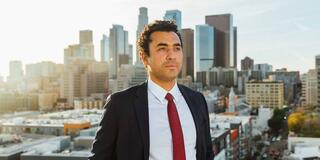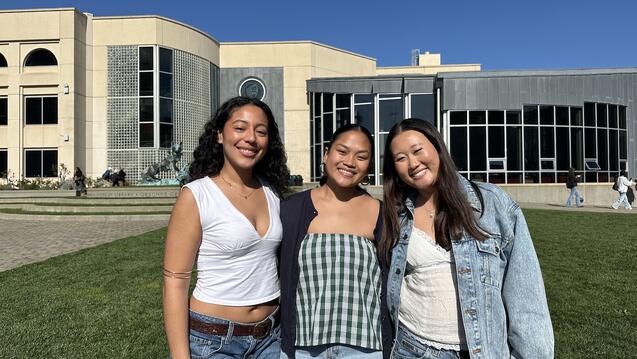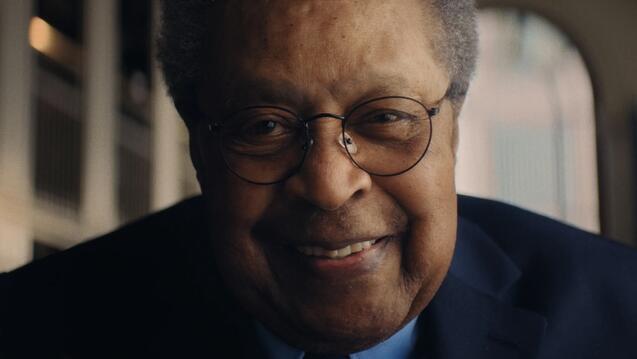A Tale From Two Cities

To a middle schooler growing up with a single mom in San Francisco’s Western Addition in the ’90s, success often meant staying out of trouble — and not much more.
But even that sometimes seemed like a tall order to David Sutton ’08. “Back then, the neighborhood wasn’t known as ‘NOPA,’ there weren’t any nice restaurants, and no one had heard of pour-over coffee,” he said. “The Western Addition was a rougher area of the city.” The former latchkey kid often found himself caught up in some of the tumult that plagued his neighborhood — enough so that he would never have predicted his future success as one of the foremost federal public defenders in the country.
Against the Odds
When he was growing up, Sutton’s single mother worked long hours downtown at Bank of America while he attended the local public schools. He had until 7 p.m. to roam the streets as he pleased, and roam he did. “I knew Muni like the back of my hand and would travel all across the city on my own. San Francisco was my playground,” Sutton said. But the same freedom that provided an intimate knowledge of his beloved city also left plenty of room for mischief.
By the time he was a few weeks into his freshman year of high school, Sutton had fallen into some bad behaviors that his mother feared could curtail his freedom — permanently. Not wanting her only son to become just another justice system statistic, she sent him down to Riverside, California, 50 miles east of Los Angeles. There, he would live with her police officer brother.
“I went down to Riverside thinking I was visiting my uncle for a weekend,” Sutton said. “I had no idea I’d be moving in with him for four years.” But those four years proved to be exactly what Sutton needed to turn his life around. “My uncle was a single cop, and he was strict. He wouldn’t put up with any of the antics that had necessitated my visit.” The no-nonsense approach worked, and Sutton finally performed at the level his family had known all along that he could. He went through high school without further incident, and, upon graduation, accepted a place at San Francisco State University as a political science major.
Earning His Way
In college, Sutton doubled down on the self-discipline he’d cultivated living with his uncle. He graduated in four years, paying his way through school partly by student-teaching in high schools. What he saw there planted a seed that would affect his entire career.
“I would see from term to term that many students just wouldn’t return. When I asked why, it turned out that they were in juvenile hall.”
Helping those students wasn’t the immediate reason Sutton decided to go to law school, however, and working as a public defender wasn’t initially the goal. Sutton is candid about his reasons for becoming an attorney.
“Initially, [it was about] upward mobility. I grew up in a single-parent home and at times, finances were tight. Becoming a lawyer was a clear path to financial stability,” he said. When applying to law school, he looked at several before becoming convinced that USF Law was where he belonged.
“I heard great things about the school from my close friend Che Hashim ’05, and it meant that I would get to stay in San Francisco.” Being able to stay in the city he had always loved sealed the deal, and the school he would come to love had its newest member of the class of 2008.
Determined to Succeed
Being accepted into law school when he previously couldn’t have imagined graduating from college proved to be the ultimate driver for Sutton. He immersed himself in studying, developed a strong and supportive community composed of both his fellow students and his professors, and participated in as many extracurricular programs as his schedule could handle. Sutton was a 1L class representative, participated in the moot court program during his second year, served as both the Student Bar Association treasurer and president, and became an engaged participant in the Academic Support Program, or ASP.
He credits ASP with easing his transition into law school, acknowledging that without it he would likely have been overwhelmed by the immediate demands of being a law student.
“Law school, especially the first year, is hard, no matter what school you attend. ASP allowed me to catch up to where other students already were, in terms of learning the basics of law,” Sutton said.
At the time, ASP required participating first years to attend a three-week orientation program, designed to foster a sense of community and introduce them to USF. The program directors work with students to devise personalized strategies for academic success, and meet with students regularly to assess their academic progress, develop their writing skills, and prepare students for exams. Sutton, true to form, took the opportunities presented by the program and used the momentum as he’d always done — he leaned in.
ASP Co-director Carol Wilson is effusive in her praise of Sutton’s commitment.
“David approached law school with a level of dedication I know he now brings to his law practice. He was a team player and worked very well in the ASP community, which by its very nature involves working in groups. He welcomed leadership roles, exemplified when he served as the law school’s SBA president in his third year. Since law school, he has always been supportive of ASP and USF. He has returned to speak at alumni lunches during the ASP summer program and has always been willing and happy to speak to students interested in criminal defense work. He’s someone I know I can call on at any time.”
Honoring His History
While progressing through ASP, he found himself experiencing an inner shift. He’d entered law school with a specific goal: to excel in school and land a lucrative position at a top firm. The first item on the agenda was going according to plan; Sutton was keeping pace with and engaged in all his classes. One class, however, was making the second agenda item a little more difficult to check off. His criminal law course impacted him deeply, and he began to realize that his particular legal fight was not going to be held in the corporate arena.
“I thought to myself, ‘Wait a minute. If I’m going to spend my life fighting for something, it can’t be about money,’” Sutton said. “I know how important corporate law is, and I know it needs to be litigated. It just no longer seemed like my fight.”
His fight was more personal.
Sutton’s first year externship was in the Marin County Public Defender’s Office, which remained his workplace through his third year of law school. Between the hands-on experience there and the criminal law courses, criminal law clinic, and moot court experiences he had at USF Law, he found his passion.
His take on it is simple: “I very likely could have been one of my clients. But for mentors, opportunities, and others taking an interest in my life’s trajectory, I never would have gone to college, let alone law school. This work is my way of honoring who I am and where I came from.”
He credits USF not only with helping him discover his path, but also with supplying the knowledge, experience, and support to follow it.
Following that path led him to the Alameda County Public Defender’s Office upon graduation as a post-bar law clerk. Thereafter, Sutton joined the Marin County Public Defender’s Office where he was thrown into the deep end.
“The thing about this area of law, there isn’t anyone holding your hand. As soon as you’re hired, you’re assigned cases. And those cases are yours alone, from start to finish. We’re not holding anyone’s briefcase,” Sutton said. He was at the Marin office for all of 18 months when the federal public defender’s office came calling in 2010. The only hesitation on Sutton’s part? The job was in Los Angeles.
Called Up
He uses sports terminology to explain his decision to leave his beloved San Francisco for its rival city.
“I’m a baseball guy. This was like being called up to the big leagues.” Big leagues, indeed. The Central District of California, which includes Los Angeles, is the country’s largest federal district — seven counties representing over 19 million people. Federal cases are brought by federal law enforcement agencies like the DEA and FBI, and the cases run the gamut from low-level street crimes, to multimillion-dollar fraud and RICO Act cases, to bank robberies. In federal crime cases, 80% of all defendants are represented by the Federal Public Defender’s Office, and those defendants include street drug dealers, white-collar doctors and attorneys, and sophisticated computer hackers.
Sutton thrived on the variety and complexity of cases crossing his desk. He rose in the ranks to serve as a supervising deputy public defender, where he was responsible for managing several trial attorneys, trial investigators, and paralegals as well as litigating his own cases. His success (including in front of the Ninth Circuit Court of Appeals) didn’t go unnoticed by the legal community at large.
In 2018 he accepted an offer to serve of counsel at Cohen Williams LLP, where he represented individuals and corporations charged with complex federal crimes, including cryptocurrency offenses, financial fraud, wire fraud, money laundering, insider trading, health care fraud, and Foreign Corrupt Practices Act violations. He lasted a year before the call to return to the public sector proved too strong to ignore. He explains his time at Cohen Williams as professionally satisfying but ultimately not destined to remain a part of his journey. He returned to the Federal Public Defender’s Office. This time, though, he’d be working as the boss.
Achievement and Advocacy
Sutton is now the Los Angeles trial chief within the Federal Public Defender’s Office for the Central District of California. He manages a team of approximately 40 attorneys and the daily operations of the Los Angeles office. Sutton still tries cases on his own, and is constantly moving the goalpost for how he defines success.
“I have to maintain and build upon the excellence established by my predecessors, which is achieved through aggressive litigation and exploiting the way our attorneys, investigators, and staff are utilizing new technologies.”
His goals aren’t limited to the traditional confines of the office, however. Sutton said, “I’m also dedicated to expanding the services that the office provides outside of traditional legal representation. Specifically, providing re-entry planning and partnering with community stakeholders to ensure our clients receive social and mental health services and housing support. If we are truly advocates for the underserved, we have to take a holistic approach to our representation, expanding our services beyond what’s needed to litigate criminal charges.” He says that his USF Law education directly engendered this outlook. It’s why he serves on the USF Law Board of Governors today, making a trip each quarter to attend board meetings.
Living His Dream
When he’s not attending those board meetings, supervising a team of eager federal attorneys, trying his own cases, actively carrying on his office’s legacy, or imagining new ways to better serve his clients, Sutton (surprise, surprise) still keeps busy. He’s an avid surfer who manages to get out for a few hours every weekend, saying “It’s the one place you can’t be reached, and my mind gets to turn off.” Once he’s out of the water, he spends time with wife, Katie, founder of Gallery 1988, an art gallery in Los Angeles, and their daughter, Ellie, 4.
Asked to think about what comes next for his career, Sutton reflects on the course that brought him from a struggling youth to a celebrated public servant. “I am living my dream. I am managing the largest federal public defender office in the largest federal district in the country. I am still trying cases, and I also get to mentor young attorneys as they grow into their role as champions of the poor and underserved.


